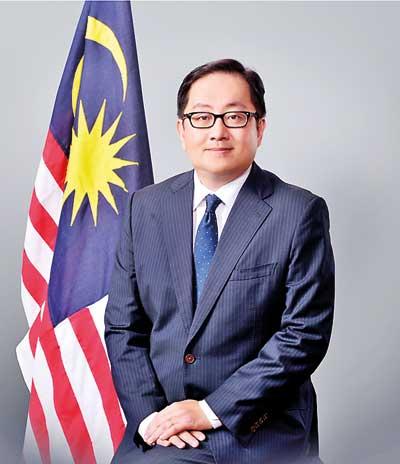26 Oct 2020 - {{hitsCtrl.values.hits}}
Malaysian High Commissioner Tan Yang Thai speaks to the Daily Mirror about the bilateral relations and  relevance of his country for Sri Lanka to tap the potential in the Association of Southeast Asian Nations (ASEAN) region. He sheds lights on the importance of regional grouping for a country like Sri Lanka to keep external pressure at bay.
relevance of his country for Sri Lanka to tap the potential in the Association of Southeast Asian Nations (ASEAN) region. He sheds lights on the importance of regional grouping for a country like Sri Lanka to keep external pressure at bay.
- We will not tolerate any extremism.
- Malaysia and Sri Lanka share intelligence among their military and police
- Malaysia can be gateway for Sri Lanka to tap ASEAN
- Malaysia is willing to export more from Sri Lanka
- Regional grouping is important
- Ready to explore gas and oil in Sri Lanka
Excerpts:
 Q Malaysia is a leading member of ASEAN. Sri Lanka is also trying to reach out to ASEAN. What role could Malaysia play in this case?
Q Malaysia is a leading member of ASEAN. Sri Lanka is also trying to reach out to ASEAN. What role could Malaysia play in this case?
We say Malaysia is the gateway to ASEAN. We always say it. It is a market of 600 million people. We are a combination of ten countries. Malaysia happens to be located in the middle of ASEAN. We have very good links with all ASEAN countries. Intra-ASEAN trade has been increasing yearly. We are now very comfortable with intra-ASEAN trade. Malaysia is well-connected with all the ASEAN states.
Q Has Sri Lanka taken it up with Malaysian authorities?
Every time I interact with the Sri Lankan government officials, I tell them the potential of ASEAN. I ask them not to shy away from exploring this potential. In Malaysia, we have very good infrastructure. We have very good ports. Our costs are very low. It is good for anyone to explore ASEAN further and make Kuala Lumpur as their headquarters so that they would be able to do businesses. It is a reasonable city to live in. Cost of living is very reasonable. That is why Sri Lankan students are currently studying in Malaysia. They take the advantage of very reasonable living conditions. You get very good infrastructure too.
Q During country was at war, Malaysia cooperated with Sri Lanka in terms of intelligence sharing etc. Sri Lanka is now faced with another kind of terrorism. In what way the two countries could cooperate now?
I think the two countries have been cooperating with each other since the very beginning. It is still ongoing between the police forces and the military. We are sending our military personnel and the coast guards to learn in Sri Lanka. We also invited the Sri Lankan security sector to share experience in counter-terrorism activities.
Q In countering religious extremism, what kind of insights Malaysia could offer?
I think Malaysia is a multi-cultural society. We have been very fortunate that nothing untoward has happened. This is because our society is very tolerant. It has been inculcated since our school days. First we have to realize that our society is multi-religious and multi- ethnic. Everyone knows the importance of working together. That is one of the reasons for the development of Malaysia. We never had any disruptions.
Q But you encounter signs of religious extremism creeping into the system there?
We do not have that kind of situation, which you have understood here in Sri Lanka. We are a Muslim majority country. We practice moderate Islam. This is enshrined in our constitution. Islam is our official religion. But other religions such as Hinduism, Christianity and Buddhism are allowed under the constitution to be practiced together with the majority Islamic religion.
Q What is the message that you have for Sri Lanka in this case?
Sri Lanka has its unique history and experience. Each country has different experience. You cannot find two countries with the same sort of experience on what is going on domestically, internationally etc. We believe in regional harmony, tolerance with each other and constant dialogue. In Malaysia, we have this very unique way of sharing our culture. We have festivals. We have the festival of Muslims. They invite others to come and celebrate with them. During Deepavali, they invite other ethnic groups to join them.
In our country, most of the companies have employees cutting across the ethnic divide. This has very good effect on tolerance. Even in the government service, we have a very good ethnic mix. It permeates through different levels of society. These are the things that bring us together.
Q In Malaysia, there are some pro-LTTE activists engaged in politics. How influential are these parties and groups in shaping political ties between Sri Lanka and Malaysia?
I think, during the war time, there was a lot of cooperation, information sharing etc. That was why the Sri Lankan and the Malaysian government worked together. Now, we are in the post war context. Malaysia is an open society. Our government is very sensitive and hears what is going on in society. We always want to make sure that it does not become an issue. We will not tolerate any extremism, while extremism does not have a place in our country. We do not tolerate this type of behaviour. Unless we keep them under check, it will jeopardize harmony.
Q What kind of advantage can Malaysia explore from Sri Lanka’s strategic positioning?
Sri Lanka is in a very unique situation and a historical period. We see similarities in the South-East Asian development too. ASEAN was created in 1967 in the wake of some internal issues. But, we looked beyond that. We came stronger and stronger. Since the end of the war, you have a lot of opportunities to look at the region. If you have strong internal dynamics of the region, you cannot only increase trade within the region, but also you will be able to portray yourself as a unity. Then, external powers cannot come in. In ASEAN, we have ASEAN centrality policy. It means the member states will determine the direction of ASEAN. No major power dictates ASEAN how we should behave. That is the success. Sri Lanka is also in a situation to do something similar. We managed to get peaceful development.
Q How do you view the new dynamics in the Sri Lanka-Malaysia relations?
Our bilateral relations have been very, very good. Recently, we had an exchange of visits at the highest level and we had it throughout the history. We have a good rapport with each other. It is not only at the level of the top leaders but also in terms of economic relations, especially investments. As you know, Malaysia was heavily involved and brought in Dialog since early 1990s. It is one of the most successful investments. It is an investment beneficial to both the countries. Dialog is one of the most successful telecommunication companies in Sri Lanka. It has brought in new innovations. It is in the forefront of digitalization of the country. It continues to be the leader in the telecommunication industry. Malaysia is proud of the part it has played. Though this is a Malaysian investment from the very beginning, we always trust that it has to be localized. The company’s CEO and the top management are from Sri Lanka. I think the Sri Lankans at the company’s top management is seconded to other regional offices, for example, in Bangladesh. Dialog Axiata has also invested in Bangladesh.
Q What are the projects lined up for future economic cooperation?
We can definitely look at energy for future cooperation. Malaysia is an energy producing country. We are very keen to export. Malaysia is also very well experienced in oil and gas exploration. We will be keen if there is an opportunity to get involved in Sri Lanka’s energy sector. It could be exploration, cooperation in building and LNG (Liquefied Natural Gas) etc.
Q Sri Lanka has taken some initiatives in this regard. Have you held talks with the Sri Lankan leaders in this regard?
We always like the private sector to lead in these types of projects. In Malaysia, we prefer the private sector driving the projects. We are there to offer our support, if needed. We are open to any suggestion and/or proposal. Apart from that, we would like to see more Sri Lankan products to be sold in Malaysia. Then, we could balance the bilateral trade. At the moment, Malaysia exports more. Malaysia has been well known to import large volume of tea from Sri Lanka. Ceylon Tea is very popular in Malaysia. Malaysians enjoy Sri Lankan tea very much, despite the fact that we are also a tea producing country. Apart from tea, there are so many other things with potential for Sri Lanka to export.
We also do import natural rubber. We are the sixth largest rubber producer in the world. But, we have big manufacturing needs. So, we are importing natural rubber. Our medical gloves manufacturers and tyre manufacturers do import rubber. I am certain that we import a lot of Sri Lankan apparel. We no longer produce apparels because we have shifted to other manufacturing sectors.
09 Jan 2025 5 hours ago
09 Jan 2025 6 hours ago
09 Jan 2025 9 hours ago
09 Jan 2025 9 hours ago
09 Jan 2025 09 Jan 2025